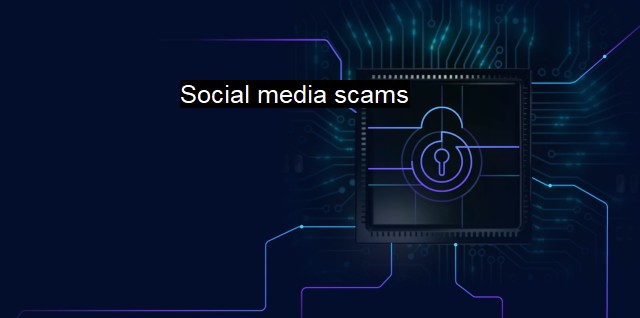What are Social media scams?
Social Media Scams in the Digital Age: Understanding the Threats and Staying Safe
"Social media scams" is a term that broadly refers to a variety of deceptive tactics and fraudulent activities committed on social media platforms. Operating on popular platforms such as Facebook, Twitter, Instagram, and LinkedIn, these scams often involve duping individuals into revealing personal information, spreading malware, or committing some form of financial fraud. Scammers take advantage of the trust built within these online communities and people's desire to connect with other individuals.For most users, social media platforms serve as a tool for them to share life moments, voice opinions, and do some online socialization. they have increasingly become avenues for cybercriminals to carry out scams and engage others in fraudulent schemes. A survey by PwC revealed that 31% of people had experienced data compromise via social media. Scammers have become increasingly tech-savvy, making their deception efforts more sophisticated and hard to detect, particularly for users with minimal technical knowledge.
The foundation for such scams is often laid by creating fake accounts. They use these veiled identities to interact with users, spreading misinformation, carrying out phishing attempts, or enticing users to visit rogue websites. Scammers can make these accounts look very convincing and legitimate by using the details and photos of real people.
Fraudsters also exploit the applications linked to platforms, embedding malicious software inside ordinary-looking games and quizzes. Once a user clicks on these innocent-appearing components, the hidden malware sensors start functioning, capturing the personal data of the user, which might include login information, financial details, and other sensitive data. This process frequently goes unnoticed by ordinaries users.
Another type of social media scam is the 'clickjacking' scam, where users are duped into spreading a rogue application to their Facebook friends, thinking that they're liking or sharing a legitimate page or post. Often, the victims of clickjacking unknowingly convey the scam further towards their circle by sharing or liking, thus causing a chain reaction.
An increasingly common scam involves impersonation, where the scammer poses as a known organization or person like the customer service of a bank or even a celebrity. In these scams, they aim to steal personal information or trick people into sending money. This type of fraud can even extend to involve romance scams, investment scams, and lottery scams.
Given the potential damage these scams pose, cybersecurity measures and antivirus protection are crucial. Traditional methods of just looking for malware signatures are often not enough for the sophisticated tricks that scammers employ. Advanced antivirus protection, combined with increased user education, is essential for reducing the risk of falling for a social media scam.
Updating your security software regularly, refraining from clicking on suspicious links, and verifying the accounts you interact with on social networks are some effective prevention steps. It is also beneficial to review and enhance your privacy settings on your social media accounts and to be wary of who has access to what you share online.
To sum up, while social media brings us closer, it also brings us closer to the potential threat of scams and cyber-attacks. This digital frontier's nature necessitates a robust digital defense, complete with advanced cybersecurity measures and antivirus protection. Every user should maintain an educated awareness and be extra cautious during social media interactions to ensure online safety.

Social media scams FAQs
What are social media scams?
Social media scams are fraudulent activities on social media platforms that are aimed at stealing information from users, such as personal or payment information, or convincing them to engage in financial transactions. Scammers often use fake profiles or phishing techniques to trick users into believing that they are a legitimate business or a friend.How can I identify social media scams?
There are several clues that can help you identify a social media scam, such as unsolicited messages from unknown users, too-good-to-be-true offers or prizes, misspelled or suspicious links, and requests for personal or payment information. You should always be cautious and verify the legitimacy of any message, link, or profile before engaging with it.What can I do to protect myself from social media scams?
There are several best practices that you can follow to protect yourself from social media scams, such as keeping your privacy settings high, not accepting friend requests from unknown users, avoiding clicking on suspicious links or downloading attachments, and not sharing personal or payment information unless you are sure that it is safe. Additionally, you can use antivirus software to prevent malware attacks and stay up-to-date with the latest cybersecurity news and trends.What should I do if I fall victim to a social media scam?
If you fall victim to a social media scam, you should act quickly to minimize the damage. First, you should change your passwords and notify your bank or credit card company if you have given out any payment information. Second, you should report the scam to the social media platform and any relevant authorities, such as the Federal Trade Commission or your local police department. Finally, you should monitor your accounts and credit report for any suspicious activity and consider using a credit monitoring service.| | A | | | B | | | C | | | D | | | E | | | F | | | G | | | H | | | I | | | J | | | K | | | L | | | M | |
| | N | | | O | | | P | | | Q | | | R | | | S | | | T | | | U | | | V | | | W | | | X | | | Y | | | Z | |
| | 1 | | | 2 | | | 3 | | | 4 | | | 7 | | | 8 | | |||||||